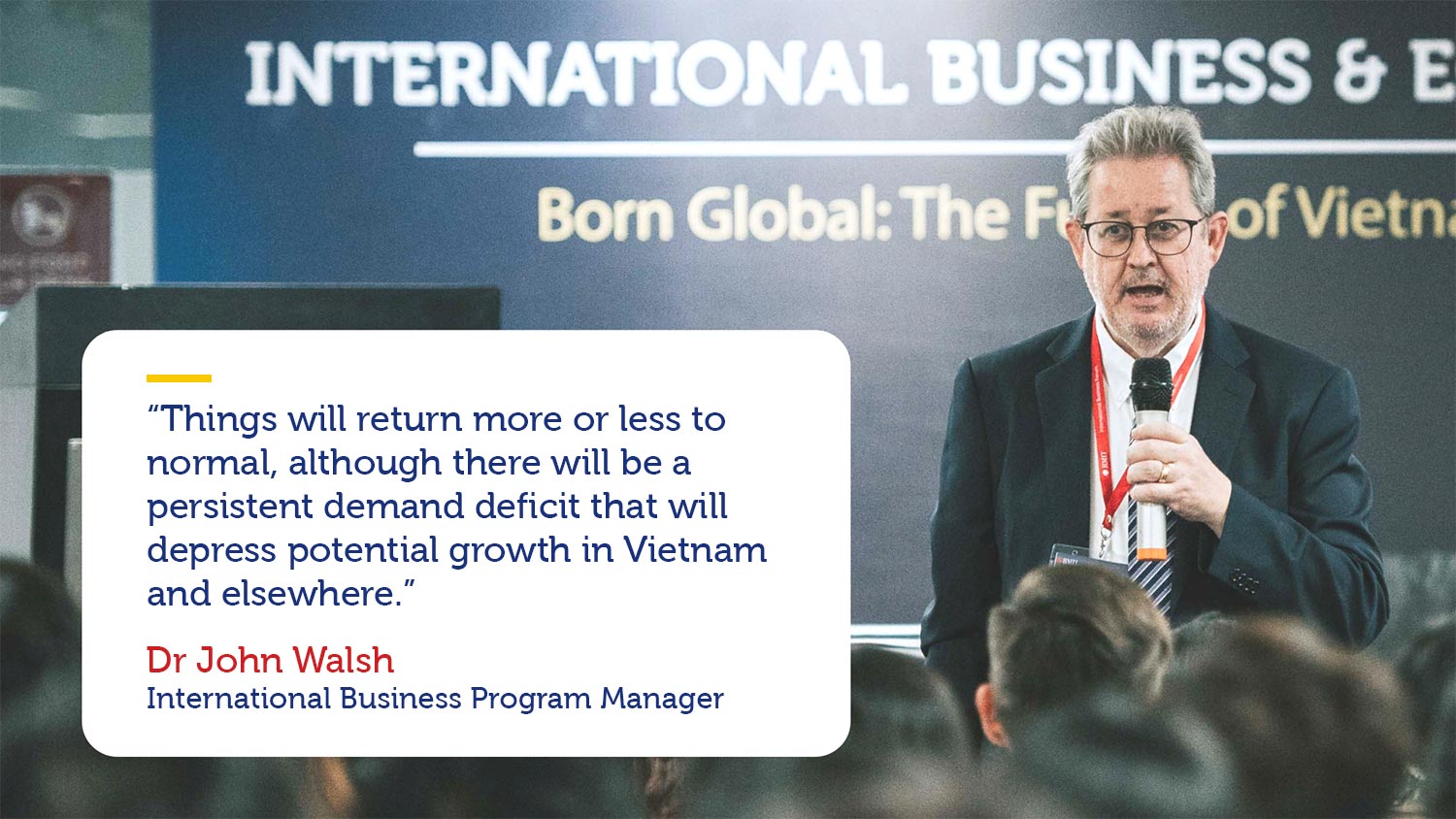RMIT University (Vietnam) International Business Program Manager from the University’s School of Business & Management Dr John Walsh speaks about the key impacts of COVID-19 on economic activity in Vietnam in this Q&A, and shares his prediction on life returning to normal.
Dr John Walsh, the Asian Development Bank forecasts that Vietnam's economic growth is expected to slow to 2.2 per cent this year, and then rebound to 6.3 per cent in 2021. What do you see as the reasons for this optimistic view?
The Asian Development Bank has a responsibility to predict and plan for the future, and will consider the best case scenario as well as other scenarios. We have seen around the world that many governments have made optimistic statements about their economic futures, partly to reassure the people and partly to reassure the markets. However, as the facts change, the predictions must also change.
If this current coronavirus is contained by the second quarter, then a positive prediction could be justified. However, it seems unlikely that there will be much room for optimism. There will be changes, and even if these changes are for the good overall, they’ll likely interfere with current economic predictions.
Considering the evolving complexities of COVID-19, what will Vietnam's economic outlook look like in the near future?
It is very difficult to be certain about the outlook because so many elements of the pandemic are still unknown. Will it mutate into a new form? Will there be a second wave of outbreaks? Are asymptomatic carriers going to infect people at some stage in the future? We cannot know the answer to any of these questions now – each pandemic is by definition, new and possibly different from any that have gone before.
However, we can anticipate the shape of the Vietnamese economy at some stage in the future when the wave of infections has decreased around the world and stabilised. The optimistic view is that things will return more or less to normal, although there will be a persistent demand deficit that will depress potential growth in Vietnam and elsewhere. In this view, market fundamentals will not change and trade will simply resume.
There is however, a more pessimistic view of the future. The China-USA relationship is probably the most important one here. If tensions are high, then that could intensify the desire among many countries to free themselves from supply chains that have been shown to be fragile, and to subsequently pursue deglobalisation. If that takes place, there could be some quite serious challenges for Vietnam’s economy.
What should the Vietnamese government prioritise now to support the economy? What do you think about support packages being introduced by other countries?
Other governments are introducing stimulus packages that reflect their own economies specifically, but they also have some common elements. Some governments are more committed to the equitable distribution of resources than others. Some face more resistance from entrenched interests; they want to make sure they keep control of the majority of government resources. No government is immune from these pressures.
One important issue to consider will be individual sectors on a holistic basis. This means, for example that if the government decides to support agriculture, it will also need to support all the stages of the supply chains that bring agricultural products into shops, restaurants and so on. The same would also be true for tourism, which needs not just hotels and accommodation but transportation, resorts, retail support and personal services. In general, it will be better to support the sectors that have the biggest impact on employment.
A number of fiscal and monetary policies have been introduced to support the economy. What are the pros and cons?
The Vietnamese government has generally acted well in supporting the economy, being decisive and responding early.
In terms of interest rates, it is unfortunate that the state of the global economy since the 2008 GFC and the subsequent crisis of austerity have meant that measures such as reducing interest rates are less effective now than they once might have been. Interest rates are very low already nearly everywhere in the world and that means using further cuts as a tool will be less effective in regulating the economy.
For the labour market, the government has signalled that it will introduce a much needed combination of both active and passive labour market policies. Passive policies include unemployment benefits so that people can survive for a while without work. Active policies include providing training and skill development programs that will help people find new types of employment.
However, no matter what actions the government takes here, the Vietnamese economy is very open and so its success will depend on what takes place in other countries as well. If other governments fail to act in the most useful ways, there will not be much that one single government can do on its own.
In the long-term, there is a need for greater co-ordination and co-operation within the ASEAN region to make ASEAN-wide policies to protect from crises like these.
In times of crises, fiscal policies are usually prioritised. Will acts like pumping money into the economy and lowering interest rates be effective?
We have seen the United States government put trillions of dollars into supporting the economy, but many experts feel that even that amount of money will not be enough. The same is true for western European countries, and we will also see the same thing in Japan soon. So, it would be wrong to claim that the Vietnamese government can solve these problems just by putting more money into the economy. It is certainly necessary but it will probably not be sufficient for a full recovery.
Most small and medium-sized enterprises (SMEs) certainly are reducing activities at this time and suffering from cash flow issues. It is likely that most SMEs will be in serious trouble after three months without income. Not all of them can be saved but it is worth the expense of trying to save as many as possible.
Public investment could be a good solution to create a ripple effect on the economy. What do you think of this statement?
This is the correct answer to an economic downturn. Recessions may be defined as losses of confidence on behalf of private investors (the economist Paul Krugman explains this best of all). This means that investors do not wish to invest, and as a result the amount of money in circulation and its velocity decreases and a vicious spiral begins. Governments must act here because they are big enough; it is not plausible to imagine that they would default on their commitments because they can simply print more money (through various legitimate means) if they need to do so. Injecting money into the economy helps restore confidence in the system overall and the money that goes to vulnerable communities tends to be spent immediately, thereby increasing the velocity of money. We have seen this approach succeed when economic recessions have occurred in the past and we have seen that the opposite approach – austerity or reducing public expenditure – has never worked.
The public investment could be in to physical infrastructure, since building tends to be a labour-intensive process and there are many such projects in Vietnam which would be good to begin. If not physical infrastructure, then there is much that could be done in the education sector, like upgrading primary schools across the country.
Story: Thuy Le





